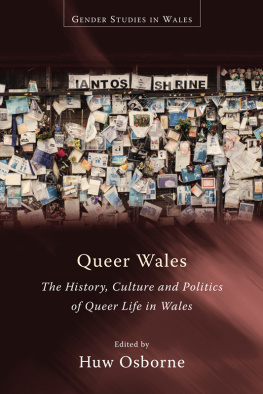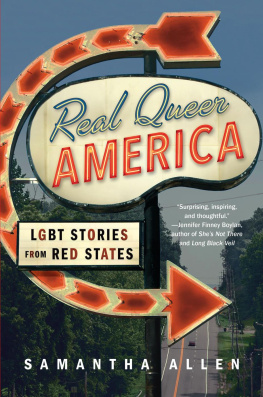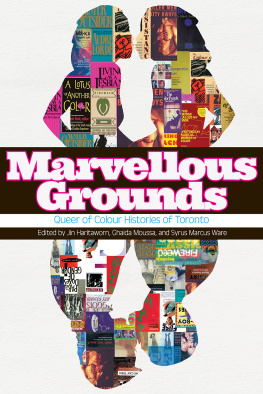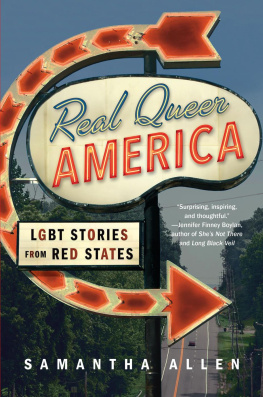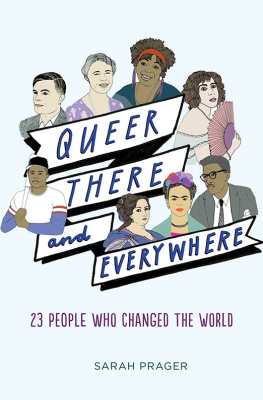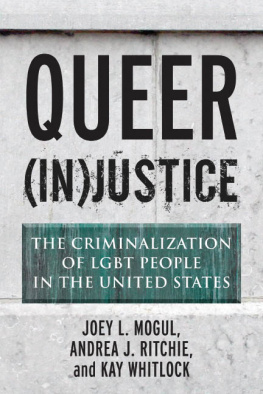Bronski - A Queer History of the United States
Here you can read online Bronski - A Queer History of the United States full text of the book (entire story) in english for free. Download pdf and epub, get meaning, cover and reviews about this ebook. City: Boston (Massachusetts);États-Unis, year: 2011, publisher: Beacon Press, genre: Romance novel. Description of the work, (preface) as well as reviews are available. Best literature library LitArk.com created for fans of good reading and offers a wide selection of genres:
Romance novel
Science fiction
Adventure
Detective
Science
History
Home and family
Prose
Art
Politics
Computer
Non-fiction
Religion
Business
Children
Humor
Choose a favorite category and find really read worthwhile books. Enjoy immersion in the world of imagination, feel the emotions of the characters or learn something new for yourself, make an fascinating discovery.

- Book:A Queer History of the United States
- Author:
- Publisher:Beacon Press
- Genre:
- Year:2011
- City:Boston (Massachusetts);États-Unis
- Rating:5 / 5
- Favourites:Add to favourites
- Your mark:
- 100
- 1
- 2
- 3
- 4
- 5
A Queer History of the United States: summary, description and annotation
We offer to read an annotation, description, summary or preface (depends on what the author of the book "A Queer History of the United States" wrote himself). If you haven't found the necessary information about the book — write in the comments, we will try to find it.
Bronski: author's other books
Who wrote A Queer History of the United States? Find out the surname, the name of the author of the book and a list of all author's works by series.
A Queer History of the United States — read online for free the complete book (whole text) full work
Below is the text of the book, divided by pages. System saving the place of the last page read, allows you to conveniently read the book "A Queer History of the United States" online for free, without having to search again every time where you left off. Put a bookmark, and you can go to the page where you finished reading at any time.
Font size:
Interval:
Bookmark:
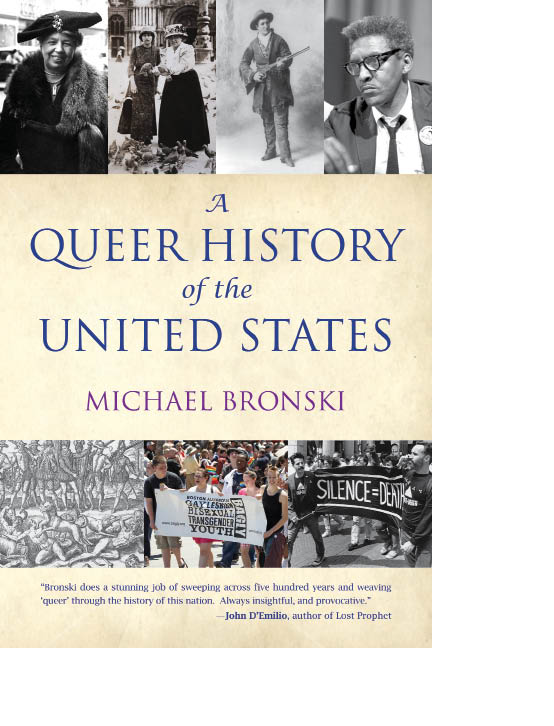
Other Books by Michael Bronski
Pulp Friction: Uncovering the Golden Age of Gay Male Pulps, 2003
The Pleasure Principle: Sex, Backlash, and the Struggle for Gay Freedom, 1998
Taking Liberties: Gay Mens Essays on Politics, Culture & Sex (editor), 1996
Flashpoint: Gay Male Sexual Writing (editor), 1996
Culture Clash: The Making of Gay Sensibility, 1984
Other Series Published by Beacon Press
Queer Action Series
Come Out and Win: Organizing Yourself,
Your Community, and Your World,
by Sue Hyde
Out Law: What LGBT Youth
Should Know about Their Legal Rights,
by Lisa Keen
Queer Ideas Series
Beyond (Straight and Gay) Marriage:
Valuing All Families under the Law,
by Nancy D. Polikoff
From the Closet to the Courtroom:
Five LGBT Rights Lawsuits That Have Changed Our Nation,
by Carlos A. Ball
Queer (In)Justice:
The Criminalization of LGBT People in the United States,
by Joey L. Mogul, Andrea J. Ritchie, and Kay Whitlock
A Queer History of the United States
Michael Bronski
ReVisioning American History
Beacon Press Boston
Dedicated to
Carl Wittman (19431986)
John Mitzel
Charley Shively
comrades, all
and
John Bronski
my father
Contents
Authors Note
A Queer History of the United States is the first book in Beacon Presss ReVisioning American History series. This series is committed to offering fresh perspectives and examining our history through the lens of those groups whose stories have been excluded from the canon.
I am a cultural critic, independent scholar, progressive activist, and college professor who has written for four decades on a broad range of topics concerning lesbian, gay, bisexual, and transgender culture. This book makes a series of observations and arguments concerning how to think about the place of LGBT people in U.S. history. It looks at how American culture has shaped the LGBT, or queer, experience, while also arguing that queer people not only shaped but were pivotal in creating our country.
Readers may not find names and events they expected and may be surprised to find little-known names and historical connections. This is not a comprehensive history, so I have been judicious about what I have chosen to include. It is foolish to think that there can be an objective view of history. Every writer approaches the facts with her or his own experiences, views, and biases. Like Howard Zinns A Peoples History of the United States a book that inspired me, but was not the inspiration for this book A Queer History of the United States has a political point of view. I hope that point of view serves as a guide to help the reader make sense of the materials presented, but also makes my own biases clear enough so that my interpretations can be resisted.
My earliest involvement in the gay community was in the gay liberation movement of the early 1970s. We had very strong opinions then. I have come to realize that in life and politics, there is always more to take into consideration. If there is one clear, unambiguous argument here, it is that the LGBT history of America is, and has always been, U.S. history.
Michael Bronski
Introduction
A decade ago, when I first began teaching lesbian, gay, bisexual, and transgender studies at Dartmouth College, I was invited to a fraternity house to moderate a group discussion titled Dont Yell Fag from the Porch. The frat was renowned for its rowdiness, and indeed, someone had recently yelled faggot at a student passing byundoubtedly not for the first time. After being publicly challenged on this behavior, the frat brothers decided to host a public forum on homophobia in the Greek system. The discussion went well and became an annual event. Faggot was yelled with less frequency, and in a few years the fraternity even had a few out gay members. But that evening, and over the years, what bothered me was that the entire discussion was predicated on the idea that Dartmouth College was essentially a straight place that had to be open to gay people. But that makes no sense. We all know that lifeand historyis far more complex than that. Or do we?
All too often most of us think in terms of simple dichotomies, including gay and straight; but who might answer to the call of fag when its history has been shown to be more than a simple either/or question? Here are a few lines from a letter Daniel Webster, a Dartmouth alumnus and hero to the college, wrote in 1804 at the age of twenty-two to the twenty-three-year-old James Hervey Bingham, his intimate from their college days: I dont see how I can live any longer without having a friend near me, I mean a male friend. Yes, James, I must come; we will yoke together again; your little bed is just wide enough. Was Daniel Webster gay? Did he love James? Did they have a sexual relationship? If so, what did this mean for his two marriages later in life? Is this queer history?
The last ten years of teaching LGBT studies has for me been a continual process of trying to figure out what is LGBT history. How do we understand it? How do we use it to think about the past? How do we use it to think about the present and the future? I certainly would have liked to quote Websters words while moderating Dont Yell Fag from the Porch. What would the students have thought about Websters obsessive desire to lie in bed with his friend James once again and hold him fast to his body? Or what if I had told them that poet Richard Hovey, who wrote the lyrics to the schools Alma Mater, was also a lover of men, and although married and an ardent feminist, socialized in gay male circles in America and Europe? (Oscar Wilde once famously hit on him at a party.) Would it have been another reason for their not shouting faggot as frequently? Would this have queered Dartmouth for them? One of the reasons for titling this book A Queer History of the United States is an attempt to queer how we think about American history.
The questions of this book are much larger than who might have been gay in the past or had sexual relations with their own sex. Over the past forty years a great deal of incredible scholarship on LGBT history has been written, and I have drawn extensively upon it, rethought it, and synthesized it here. What follows is a long meditation on not only LGBT history but, because it is inseparable, all of American history. After two years of thinking and writing, I want to start by suggesting that there are two crucial concepts to consider when examining LGBT history in the United States.
The first is that the contributions of people whom we may now identify as lesbian, gay, bisexual, or transgender are integral and central to how we conceptualize our national history. Without the work of social activists, thinkers, writers, and artists such as WeWha, Walt Whitman, Emily Dickinson, Martha Calamity Jane Cannary Burke, Edith Guerrier, Countee Cullen, Ethel Waters, Bayard Rustin, Roy Cohn, Robert Mapplethorpe, Cherrie Moraga, and Lily Tomlin, we would not have the country that we have today. Women and men who experienced and expressed sexual desires for their own sex and those who did not conform to conventional gender expectations have always been present, in both the everyday and the imaginative life of our country. They have profoundly helped shape it, and it is inconceivable, and ahistorical, to conceptualize our traditions and history without them.
The second, and slightly counterintuitive, key concept is that LGBT history does not exist. By singling out LGBT people and their lives, we are depriving them of their centrality in the broader sweep and breadth of American history. The impulse to focus on lives that have been shunned, marginalized, censored, ignored, and hidden in the pastand in previous histories of the United Stateshas been revolutionary in the growth of a vibrant LGBT community. This impulse is part of a larger social and political movement of Native American, African American, Latino/Latina, and other marginalized identities and cultures to reclaim and celebrate our lost histories. (Although as an identity, LGBT has, as we will see, a much newer history than other identities.) But it is equally important to understand that this is a transitional moment in history that has emerged in the past forty years precisely because those marginalized groups were so deeply dismissed.
Font size:
Interval:
Bookmark:
Similar books «A Queer History of the United States»
Look at similar books to A Queer History of the United States. We have selected literature similar in name and meaning in the hope of providing readers with more options to find new, interesting, not yet read works.
Discussion, reviews of the book A Queer History of the United States and just readers' own opinions. Leave your comments, write what you think about the work, its meaning or the main characters. Specify what exactly you liked and what you didn't like, and why you think so.


